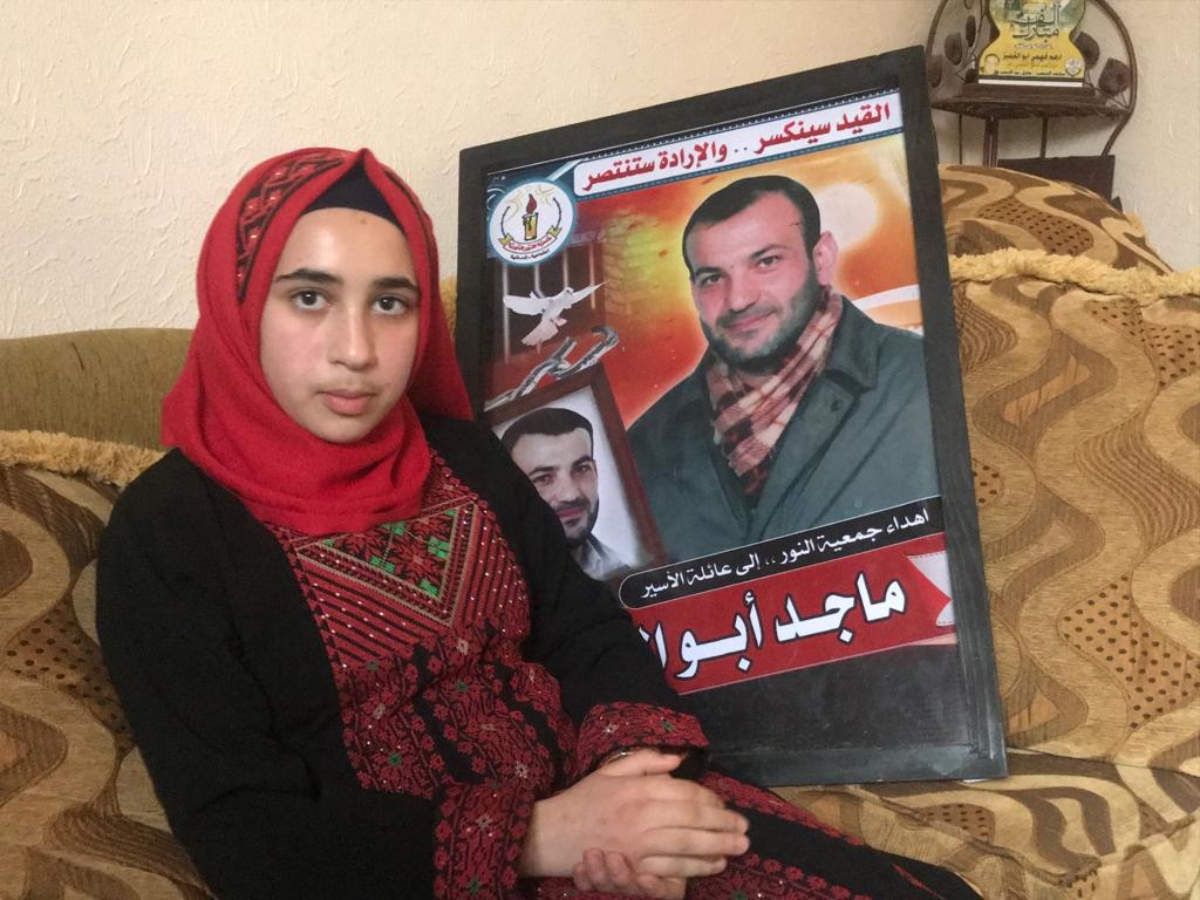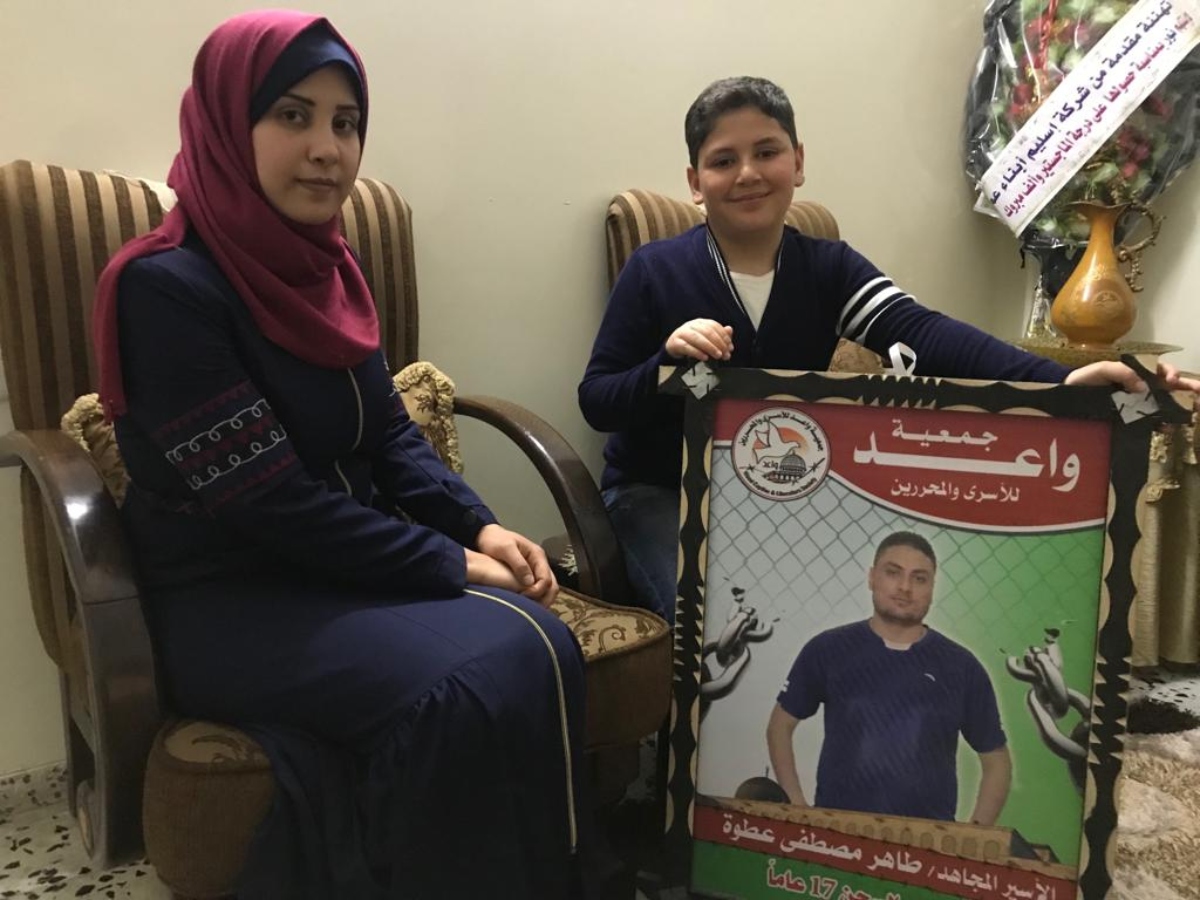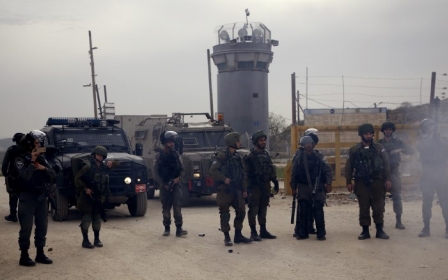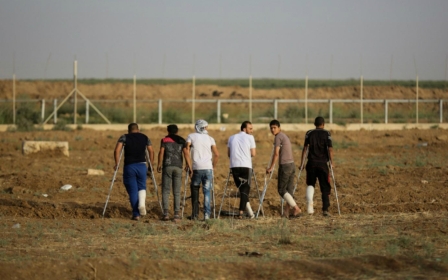Torn apart: As loved ones sit in jail, Gaza families endure strip searches and radio silence
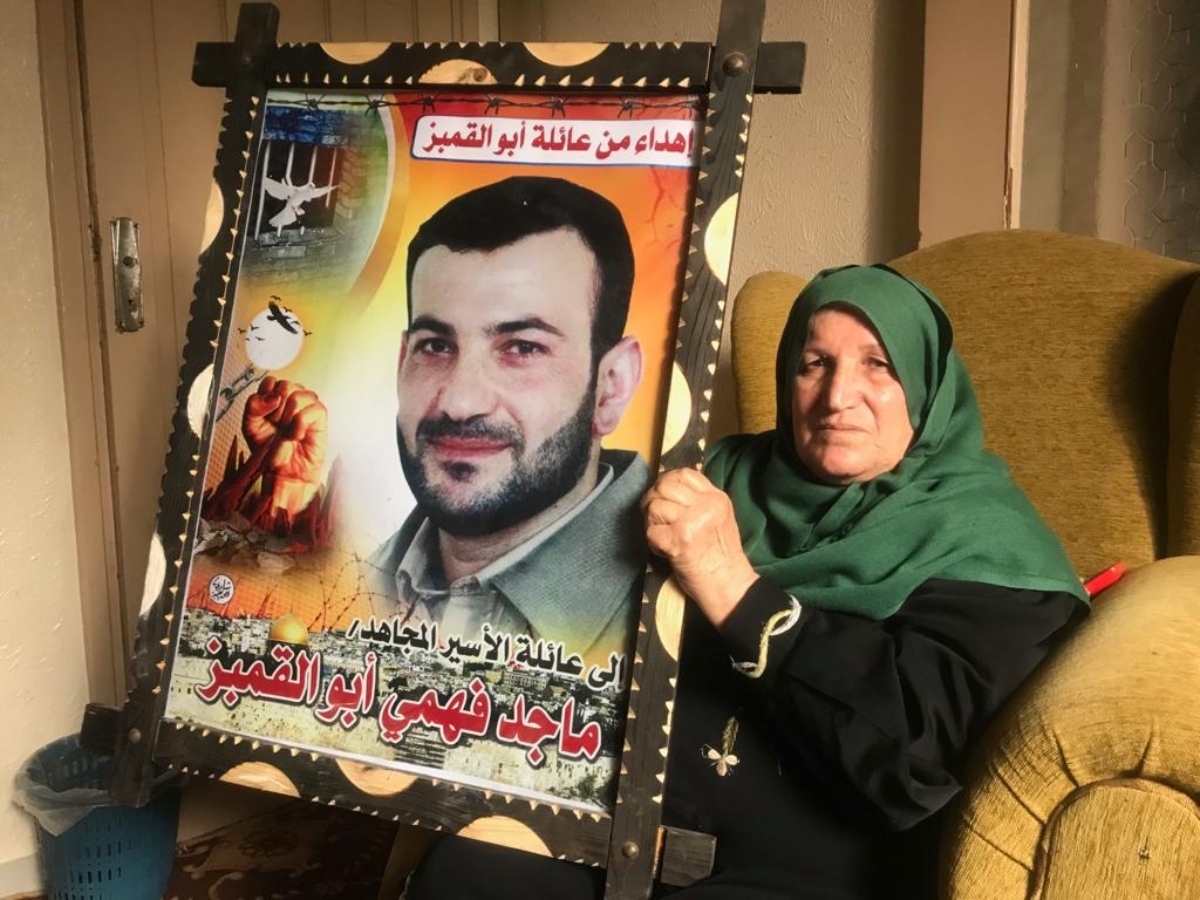
It was midnight on Monday when seven-year-old Huda got home in central Gaza City. Around a dozen family members were there - including her 70-year-old grandmother, uncles, aunts and cousins - eagerly awaiting to hear about her trip, as the little girl had gone with her mother Maryam to visit her father Yasser, currently serving a life sentence in an Israeli prison.
Her face pale, Huda - whose name, like that of her relatives, has been changed at her family’s request - struggled to remain standing for more than a couple of minutes. The girl had spent over 12 hours on the bus and was examined and strip-searched by Israeli officers three times during this journey, which began at 4am.
'We knew nothing about him or how he was living'
- Um Nabil, prisoner's mother
Older family members directed their questions to her mother, but Huda’s cousins started an interrogation-like questioning about their uncle: How was he living in prison? Did he feel happy learning his other daughter, aged 18, had recently gotten engaged?
Despite her exhaustion, the stresses of the journey and the sadness of leaving her father after a short visit, Huda remains one of the lucky few in the Gaza Strip who was able to visit a detained relative.
As of March, some 294 Palestinians from Gaza were held in Israeli prisons, according to leading prisoners’ rights group Addameer.
New MEE newsletter: Jerusalem Dispatch
Sign up to get the latest insights and analysis on Israel-Palestine, alongside Turkey Unpacked and other MEE newsletters
Many Palestinians in the besieged enclave have no access to loved ones detained by Israel - as prisoners, especially those accused of being involved with Hamas, have been used as a means of pressure on Palestinian factions.
With 17 April marking Palestinian Prisoners' Day, several families told Middle East Eye of the devastating effect such separation has had on the relatives outside of prison.
Radio silence
Zina, 14, and Yousef, 12, live with their grandmother Um Nabil in a two-storey home rebuilt after the 2014 Israeli offensive on Gaza.
Their father, Majed Abu al-Gomboz, was arrested by Israeli forces in 2006 alongside his eldest brother Nabil and younger brother Adham.
Nabil was released the next day and Adham was freed seven months later, but Majed remained behind bars after being accused of belonging to Hamas.
“After one year of harsh investigation, he was sentenced to 19 years in prison,” Majed’s mother Um Nabil, 71, told Middle East Eye. “It was a shock for me and all of my family members. His wife was pregnant with his second baby [Yousef] and when she gave birth to the baby, she asked for a separation.”
Following their parents’ divorce, Um Nabil said, the “two little angels” came to live with her, as children over the age of 10 go with the father’s family according to Palestinian law.
Between 2006 and 2012, Um Nabil said, the family was prevented from visiting Majed in prison or having any other form of direct contact with him.
“We knew nothing about him or how he was living,” she said.
Palestinian resistance forces kidnapped Israeli soldier Gilad Shalit in Gaza in 2006. As a result, Israel punished Palestinian prisoners from the blockaded territory in order to exert pressure for the soldier’s release, up until Shalit was freed in October 2011 in a prisoner swap deal.
During those six years, Zina, Yousef and their grandmother only gathered snippets of information from released prisoners, some of whom Majed had tasked with transmitting messages to his family on their way out.
Better than nothing
After the Shalit prisoner swap deal, Um Nabil and her grandchildren were finally able to visit Majed in prison in 2012.
“I was very enthusiastic to visit my father,” said Zina, who was seven years old when she was finally able to visit him.
“I did not remember the features of his face because he was arrested when I was a baby. The day we visited him, my grandmother had a picture with her and along our journey, she asked me to look at the pictures in order to keep the features of my father’s face in my mind.”
But upon their arrival at Eshel prison in Beersheba, Um Nabil described the long-awaited reunion as “really shocking”.
“When I arrived the prison, me and my brother Yousef were placed in a corridor with a glass separator,” Zina explained. “My grandmother pointed her finger to a man behind the glass and told us: ‘This is your father.’
“He was completely different than the one we saw in the picture.”
The children had grown up seeing posters of their father with a neatly trimmed, dark beard, a kind smile on his face. But Majed now looked older and thinner. His beard was longer, and his head was now covered in white hair.
“We were given the chance to speak to him several minutes through a handset in order to hear each other,” Zina said. “At the end, we were allowed on the other side, without our grandmother, to hug him.”
According to Israeli prison rules, only children under the age of eight are allowed to have physical contact with prisoners during family visits.
Finally allowed to touch, the Abu al-Gombozes were at a loss for words. Majed held five-year-old Yousef for the very first time in his young son's life, and seven-year-old Zina for the first time since she was a baby.
“The whole five minutes of the visit without the glass wall between us and my father, he kept us in his arms close to his chest,” Zina said. “From time to time, he squeezed us and looked at our faces, but he didn’t utter a word.”
For Zina and Um Nabil, the 45-minute meeting with Majed was a “golden opportunity” worth the exhausting 12-hour journey to get there.
For the next four years, the three made the trip to visit Majed once every two months.
But in late 2016, Israel’s parliament, the Knesset, passed a law barring family visits for Hamas-affiliated prisoners, as Israel once again used Palestinian detainees as a means of pressure to obtain the release of the two Israeli soldiers believed to have been killed in the 2014 war.
According to the Waed Association for Prisoners and Former Prisoners, some 600 Palestinian families have been affected by the law, including 120 in Gaza.
“Since then, we haven’t visited him,” Um Nabil said, wondering: “What can a mother who hasn’t hugged her son in 13 years nor seen him in three years say?”
Intentional humiliation
Nour Atwa, 28, expressed the same feelings for her “beloved” husband Taher Atwa.
According to his wife, Taher was detained by Israeli forces in 2012 and held for about one year before he was sentenced to 40 years in prison.
“I was really shocked,” Nour told MEE. “When I heard about the 40-year-sentence, I fainted. I could not imagine how I could live all that time without Taher.”
A year later, Taher accepted a plea deal and his sentence was reduced to 17 years.
“When he was sentenced, he asked me whether I would remain his wife or not,” she said. “I persistently said I would even if spend all of his life in prison,” she answered.
The couple already had two sons and Nour was pregnant of their third when Taher was arrested. Nour said she struggled at first to face life without her husband.
“It was hard for me to decide what to do,” she said.
“I was completely separated from my husband for 12 consecutive months,” she said, adding that she had zero contact with Taher during that time period. “When I spoke with him on the telephone after he was sentenced, I felt relaxed because we agreed on how my life with my sons would be.”
'What can a mother who hasn’t hugged her son in 13 years nor seen him in three years say?'
- Um Nabil
Another 16 months passed with complete radio silence, then she was told in June 2014 by the International Committee of the Red Cross (ICRC) office in Gaza that she could visit Taher for the first time.
“I felt very excited and spend all night preparing myself and my three children for that visit,” she said.
“We boarded the bus at 4am. When we arrived in Erez Crossing, the Israeli military officers searched us,” she recalled. “My eldest son, who was three years old, was forcefully separated from me and taken to another room, where his clothes were taken off despite it being cold.
“He was crying. Then, they allowed me to enter the room and asked me to take off his diaper. They then passed a machine across every inch of his body and asked me to put his clothes back on and we left.”
When Nour and her three sons arrived to the Nafha prison in Mitzpe Ramon, they were placed in a big room with several toilet stalls in the corners. There, Nour was asked to take off all of her clothes.
“The Israeli occupation soldiers separated me from my sons and asked me to get into one of the toilets and take off all my clothes, only keeping my underwear,” she said. “At the beginning, I refused, but after a couple of minutes of discussion, like many others, I decided to obey the oppressive order.”
Nour said she was strip-searched by both male and female Israeli officers in front of the other visitors before she was allowed in.
Finally seeing her husband after more than two years apart, Nour called the reunion “very emotional minutes”. Just like in Zina and Yousef’s case, the children were allowed to come in and hug their father, while Nour stayed behind glass.
The Atwa family’s ordeal was not over however, as Nour struggled to ascertain her rights during the second visit two months later.
“We passed through three checkpoints as usual, including Erez. The same thing happened in prison. They asked me to take off my clothes, but this time I refused,” she said.
“Only a wall was separating me from my husband. They told me I would not be able to visit him if I did not accept the strip search,” Nour added, recalling the internal struggle she underwent at the time. “I said I would not go through with the visit, collected my three sons and went back home.
“But I wept all the way back and was unable to eat or drink for about three days.”
Nour filed a complaint to ICRC about the strip search. After her complaint, Israeli prison authorities allowed women visitors to wear a loose-fitting thobe over their naked bodies during the strip search.
Violation of basic rights
Nour was able to visit her husband 11 times between June 2014 and July 2017 before the Israeli ban was passed.
“I have been suffering too much since I was told that I was barred from visiting my beloved husband,” Nour said. “I never thought I would be separated from my husband for a long time.”
Nour’s pain is only worsened when she sees families whose imprisoned loved ones are not tied to Hamas leave Gaza for visits, which only occur on Mondays.
'I have been suffering too much since I was told that I was barred from visiting my beloved husband'
- Nour Atwa, prisoner's wife
“My heart beats too fast every Monday, when I see families of other prisoners visit their relatives and I stand still when my sons ask me why they don’t visit their father?”
Speaking to MEE, Suhair Zaqqout, the spokeswoman for the ICRC in Gaza, said: “Since July 2017, we have been discussing this issue with Israeli authorities, but there has been no progress.”
Zaqqout said that the restrictions on family visits was a violation of the international law. “According to the Fourth Geneva Convention, the occupying power should allow family visits for the prisoners of wars as much as possible.”
Israeli authorities have regularly cracked down on all communications between prisoners and the outside world. Phone calls and messages are banned, and while some local radio stations broadcast messages from families to their imprisoned sons, Israeli prison services often ban these stations as part of sanctions imposed on the prisoners.
Breaking the silence
Prisoners can make only calls only via smuggled mobile phones and pass messages to the outside through released prisoners or visiting family members.
'I ask myself when will my father come back home?'
- Mohammed
Earlier this month, Palestinian prisoners held an eight-day hunger strike to denounce a heightened crackdown inside prisons - including the installation of devices to jam phone and radio signals, further cutting them off from their families.
The hunger strike ended on Monday after the Israeli Prison Service (IPS) agreed to instal payphones and let prisoners speak to their families three times a week. Calls will nonetheless be censored and cost prisoners 2.5 shekels ($0.70) per minute - a noteworthy cost given that Israel has pressured Palestinian authorities to cut financial aid to its political prisoners.
But despite the limitations, Nour Atwa, who since her husband’s detention has done her Master’s research on prisoners’ issues, said the new accommodations were “a breakthrough”.
“It will help prisoners’ families keep in continuous contact with their sons in prisons,” she said.
While Nour was hopeful that recent changes would make a big difference for families, children of prisoners told MEE they continued to suffer growing up deprived of a relationship with their fathers.
Holidays are particularly hard for Zina.
“When we fast in Ramadan, my friends at school describe how they sit around the iftar table with their parents who made them the best food,” Zina said. “They unintentionally make me cry because I wish I had my parents with me in order to experience an atmosphere of happiness.”
Nour and Taher Atwa’s son Mohammed also spoke of the pain he felt, wishing that his father was around to ask him about his grades, after-school activities, or everyday life.
“I see the fathers of my friends visiting our school, and sometimes they hold their hands and take them home. I will hide in a corner and start crying,” he said. “I ask myself when will my father come back home?”
Middle East Eye delivers independent and unrivalled coverage and analysis of the Middle East, North Africa and beyond. To learn more about republishing this content and the associated fees, please fill out this form. More about MEE can be found here.


